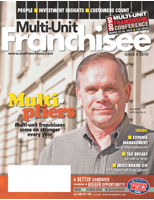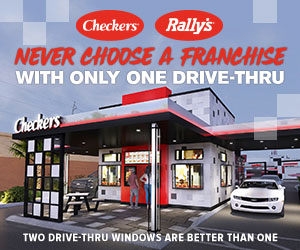Multi-Unit Leadership: A Conversation with Jim Sullivan on Multi-Unit Leadership for the 21st Century
Jim Sullivan is the CEO and founder of Sullivision.com, a company that designs and delivers operations and leadership training programs for companies and franchisees worldwide. Clients include The Walt Disney Company, McDonald's, Panera Bread, Regis Corp., Jiffy Lube, Wal-Mart, American Express, Applebee's, Domino's, Dunkin' Brands, and Coca-Cola. Three years ago Sullivan's company began researching the best practices of high-performing multi-unit leaders.
As he readied his presentation for his session at this year's Multi-Unit Franchising Conference (March 24-26, 2010, at Mandalay Bay in Las Vegas), we sat down with him to find out why his company conducted the research, what some of the key findings were, and how this all applies to multi-unit franchisees.
Why research multi-unit leaders?
Sullivan: Two key reasons. First, there is no evidence that it's been done with any degree of complexity in the past. And second, everyone presumes that the skills necessary to successfully operate one unit are identical to the skills needed to successfully operate multiple units. That is a dangerous and incorrect assumption. Going from hands-on management to indirect leadership is a complex skill that most franchisees are unprepared for. Franchisors have not been good at identifying, developing, and replicating multi-unit leadership skills among their franchisees.
Why is that?
Sullivan: A variety of reasons. Perhaps the people marketing the franchise have not operated multiple units themselves, or most likely they presume the franchisee will figure it out as they go along, just like they did. So, lacking a realistic development and training program, what most multi-unit managers or multi-unit operators end up doing is acting like a "unit manager on steroids" instead of mastering the art of indirect influence and governance. Store management is a doing job. Multi-unit management is a thinking job. This is not a time where you can afford to learn as you go.
How many multi-unit leaders were involved in your research?
Sullivan: We began in 2006 with 202 franchisees, area managers, franchise business consultants, area developers, and regional managers. We repeated the research in 2007, 2008, and 2009, and have now collected the best practices of over 1,500 high-performing multi-unit leaders across North America's food-service and retail industries. We've compiled the insight into a series of books, DVDs, and live workshops and have just introduced a customizable off-the-shelf training kit called Multi-Unit Leadership-in-a-Box.
Leadership can be a difficult competency to corral and define. How did you frame your research?
Sullivan: We began with a simple question: Why do some multi-unit leaders and their teams achieve more success than others while doing the exact same work? I sensed that if we could answer this question across a variety of different companies, brands, and geographies, and then compile and categorize the best practices that these high-performers exhibited, then it seemed to me we'd have a resource that would be extremely valuable for teaching, training, and developing 21st-century multi-unit franchisees. And that's what happened. More than 170,000 people have bought our book on multi-unit leadership in the last 18 months.
Are 21st-century multi-unit leaders that much different from 20th century ones?
Sullivan: They'd better be. The "internal customers" we hire and the "external customers" we serve are a lot different than they were 10 years ago. And as our employees and customers change, so too changes the meaning of leadership and customer service. That requires a new mindset: leading from the middle, teaching your managers how to think instead of just what to do; and learning the difference between control and governance. I say good riddance to the old sink or swim, learn on the job, figure it out as you go along syndrome that led many potentially successful franchisees to fail.
Have franchisors responded to your research and resources?
Sullivan: Very much so because they and their franchise brand partners both want the same thing: to successfully open more stores and expand sales and market share. We're helping them not make rookie mistakes and simultaneously learn from the expertise of thousands of people who figured out the best way through years of experience before them.
How did you categorize this collective experience of 1,500 multi-unit leaders?
Sullivan: It was difficult. Early on, we began recognizing similarities and patterns in experience and best practices as the feedback came in. Working with a university team of specialists who helped us with the research, we began organizing the collective experience into leadership "buckets." These eventually became seven distinct leadership stages that high-performing multi-unit operators exhibit.
And those categories are?
Sullivan: Brand Ambassador, Talent Scout, Servant Leader, Head Coach, Marketing Guru, Synergist, and Goal Getter. Each of the seven leadership stages is sequential, but fluid. A multi-unit leader may move from one stage to the next and then return to a previous stage when they encounter a new situation. You may, for instance, have to use the Marketing Guru skills in one unit and emphasize Talent Scouting at another unit. One stage or competency serves as a building block or core element of another. You can't just be sort of good at a few of the seven; you must ultimately master each stage. Professional musicians or athletes are the only professions I can think of where someone can be really good at just one thing and succeed.
Do franchises fail because they have bad multi-unit leaders?
Sullivan: Companies don't fail because they have "bad" multi-unit leaders. They fail because they have a large number of mediocre ones. Our tools help companies identify the areas their multi-unit operators can be better at to succeed. Great leaders are characterized not by the absence of weaknesses but the presence of strengths, and these strengths are not always the same ones. Effective leadership practices are specific to an organization. Many leaders who are successful in one organization sometimes switch to another and then fail. We've tried to identify and then teach the core competencies that all high-performing multi-unit leaders share.
Your book--Multi Unit Leadership: The 7 Stages of Building High-Performing Partnerships and Teams--stresses that a common failure of new multi-unit operators is that they don't spend enough time in their stores. Why is that so important?
Sullivan: Because the store is where the company meets the customer. You can't manage a territory by simply reading financial reports and numbers. If that were true, I could beat Roger Federer at tennis by watching the scoreboard while he watched the tennis ball. In our live workshops and in the new Multi-Unit Leadership-in-a-Box kit, we spend a great deal of time detailing the wrong and right ways to conduct high-impact store visits. I think this--along with effective time management--is the number-one most important job of an effective multi-unit leader, and also the most overlooked. The focus of every visit is not the "condition of the unit" but the development of its managers and crew. You are not visiting stores, you are visiting people.
Talk a little about your Multi-Unit Leadership-in-a-Box kit.
Sullivan: For the last three years, our customers have been telling us they want a comprehensive and customizable off-the-shelf training program that uses the same research, slides, interactivities, videos, and narratives we use in our live workshops--only they want it so their trainers can teach it and customize it specifically to their brand and team. After we do one of our live multi-unit leadership workshops there's a lot of energy and impetus in the team in the rooms, but nothing for the people who couldn't be there or for future franchisees. So we spent the better part of last year developing this comprehensive kit for franchisors to use in their companies to train and develop their franchisees, business consultants, and area developers to be more successful multi-unit operators. It combines live instruction, PowerPoint decks, Leader's Guides, Learner's Workbooks, video, audio, and even an online train-the-trainer component. There's no licensing fee or training necessary, it's one price, out of the box, ready to go. Your trainers open the box and teach the class in whatever time frames you have available, the instructions show you how. It's idiot-proof in its design, ease, and execution. And it really speaks to how today's generation likes to learn. It's full of interactivity and application. We skinnied the monologue and fattened the dialogue. You can go to our website (Sullivision.com) to see samples and learn more. It's truly like having the experience of a thousand successful multi-unit leaders in one box.
What final advice would you offer multi-unit operators?
Sullivan: One of the biggest mistakes you can make as a leader is presuming that what made you successful to this point will continue to do so. To lead successfully you must learn better, and more often. These challenging times require a new style of leadership and motivation and training that may not be able to be generated inside your own company. The more you spend on training, the less you'll spend on advertising, guaranteed. So either change with the times or the times will change you.
Share this Feature
Recommended Reading:
FRANCHISE TOPICS
- Multi-Unit Franchising
- Get Started in Franchising
- Franchise Growth
- Franchise Operations
- Open New Units
- Franchise Leadership
- Franchise Marketing
- Technology
- Franchise Law
- Franchise Awards
- Franchise Rankings
- Franchise Trends
- Franchise Development
- Featured Franchise Stories
FEATURED IN

Multi-Unit Franchisee Magazine: Issue 2, 2010

$300,000
$150,000





 The multi-unit franchise opportunities listed above are not related to or endorsed by Multi-Unit Franchisee or Franchise Update Media Group. We are not engaged in, supporting, or endorsing any specific franchise, business opportunity, company or individual. No statement in this site is to be construed as a recommendation. We encourage prospective franchise buyers to perform extensive due diligence when considering a franchise opportunity.
The multi-unit franchise opportunities listed above are not related to or endorsed by Multi-Unit Franchisee or Franchise Update Media Group. We are not engaged in, supporting, or endorsing any specific franchise, business opportunity, company or individual. No statement in this site is to be construed as a recommendation. We encourage prospective franchise buyers to perform extensive due diligence when considering a franchise opportunity.